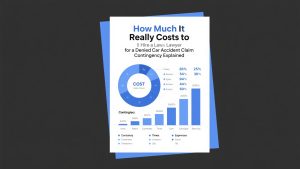When your car accident claim gets denied by an insurance company, the financial and emotional stress can feel overwhelming. Understanding the true cost of hiring a lawyer becomes crucial in making informed decisions about pursuing your rightful compensation. The reality is that most people facing denied claims worry about legal fees adding to their already mounting expenses, but the contingency fee system provides a solution that makes quality legal representation accessible regardless of your current financial situation. Lawyer cost denied claim concerns often prevent accident victims from seeking the help they need, yet the contingency fee structure ensures that you only pay when your case succeeds.
Understanding the True Financial Structure of Contingency Fee Arrangements
The contingency fee system represents a fundamental shift in how legal services are accessed and paid for, particularly in personal injury and denied claim cases. Under this arrangement, attorneys agree to represent clients without requiring any upfront payment, instead taking a predetermined percentage of any settlement or court award obtained. This percentage typically ranges from 25% to 40% of the total recovery, with most car accident cases falling into the 33% to 37% range depending on the complexity of the case and the stage at which it resolves. The beauty of this system lies in its alignment of interests between attorney and client – your lawyer only gets paid when you receive compensation, creating a powerful incentive for them to maximize your recovery and work efficiently toward resolution.
When evaluating contingency fee car accident arrangements, it’s essential to understand what expenses are and aren’t included in the contingency percentage. Most contingency fee agreements cover the attorney’s time, legal expertise, case preparation, negotiations with insurance companies, and court representation if litigation becomes necessary. However, case expenses such as medical record retrieval fees, expert witness costs, court filing fees, deposition expenses, and investigation costs are typically handled separately. Some attorneys advance these costs and deduct them from your settlement, while others may require payment as expenses arise. The total cost structure should be clearly outlined in your retainer agreement, including how expenses will be handled if the case is unsuccessful.
The percentage charged in contingency fee arrangements often varies based on several factors that directly impact the complexity and risk of your case. Cases that settle during initial negotiations typically command lower percentages, often in the 25% to 30% range, because they require less time and resources to resolve. If your case requires filing a lawsuit and proceeding through discovery, the percentage may increase to 33% to 35% to account for the additional work involved. Cases that proceed to trial often see contingency fees in the 35% to 40% range, reflecting the substantial time investment, preparation requirements, and risk associated with jury trials. Some attorneys use a sliding scale that increases the percentage as the case progresses through different phases, while others maintain a flat percentage regardless of how far the case proceeds.
Geographic location significantly influences contingency fee structures, with attorneys in major metropolitan areas often charging higher percentages than those in smaller markets. This variation reflects differences in overhead costs, market competition, and local legal customs. Additionally, the strength of your case plays a crucial role in fee negotiations. Cases with clear liability, substantial damages, and strong evidence may command lower contingency percentages because they present less risk to the attorney. Conversely, cases with disputed liability, complex legal issues, or uncertain damages may require higher percentages to compensate for the increased risk and effort required. Understanding these factors helps you evaluate whether a proposed contingency fee arrangement represents fair value for the legal services you’ll receive.
Hidden Costs and Additional Expenses Beyond the Contingency Fee
While the contingency fee covers your attorney’s compensation, numerous additional expenses can accumulate throughout the legal process that significantly impact your net recovery. Medical record retrieval represents one of the most common and necessary expenses, with hospitals and healthcare providers typically charging $25 to $100 per set of records, and complex cases may require records from multiple providers spanning several years. Expert witness fees can range from $300 to $1,000 per hour for testimony, with additional charges for report preparation, case review, and deposition attendance. In cases involving serious injuries or disputed liability, expert witnesses in fields such as accident reconstruction, medical treatment, vocational rehabilitation, and economic damages may be necessary, potentially adding thousands of dollars to case expenses.
Court-related expenses form another significant category of costs that can impact your case budget. Filing fees for lawsuits typically range from $200 to $500, but additional motions, appeals, or complex procedural requirements can multiply these costs. Deposition expenses include court reporter fees, transcript costs, and facility rental charges, often totaling $500 to $1,500 per deposition depending on length and complexity. If your case requires multiple depositions of parties, witnesses, and experts, these costs can quickly accumulate to several thousand dollars. Video depositions, which are increasingly common in serious injury cases, add additional expense but can be valuable for preserving testimony and creating compelling presentations for settlement negotiations or trial.

Investigation and documentation expenses represent crucial investments in building a strong case but can add substantial costs to your legal representation. Private investigators may charge $75 to $150 per hour for services such as witness interviews, scene investigations, and evidence gathering. Accident reconstruction specialists typically charge $150 to $300 per hour for analysis and report preparation, with additional fees for courtroom testimony. Photographic and video documentation, including drone footage for complex accident scenes, can cost several hundred to several thousand dollars depending on the scope of work required. These investigative expenses often prove essential in denied claim cases where insurance companies have conducted their own investigations and reached conclusions unfavorable to your claim.
Technology and administrative costs have become increasingly significant in modern legal practice, though they’re often absorbed into general overhead rather than charged separately. Electronic discovery costs, including data processing, review platforms, and digital forensics, can be substantial in cases involving extensive electronic communications or complex liability issues. Case management software, legal research databases, and specialized litigation support tools represent ongoing expenses that support effective case handling. While most attorneys include these costs in their general overhead, some may charge separately for extensive electronic discovery or specialized technology requirements, making it important to clarify these potential expenses during initial consultations.
Maximizing Value and Making Informed Decisions About Legal Representation
Choosing the right attorney for your denied claim case requires careful evaluation of both cost and value factors that extend far beyond the contingency fee percentage. Experience handling denied claims specifically represents one of the most critical factors in attorney selection, as insurance companies use sophisticated strategies to deny valid claims that require specialized knowledge to overcome. An attorney who regularly handles denied claims understands the common denial tactics, knows how to gather evidence that addresses specific denial reasons, and has established relationships with experts who can strengthen your case. The value of this specialized experience often far exceeds any difference in contingency fee percentages between attorneys.
When evaluating potential attorneys, consider their track record of success in cases similar to yours, including both settlement amounts and trial verdicts. Attorneys who consistently achieve favorable outcomes for denied claim cases demonstrate the skills and resources necessary to maximize your recovery. Ask specific questions about their experience with your type of denial, whether they’ve handled cases against your insurance company, and what strategies they typically employ to overcome similar denials. The attorney’s willingness to take your case to trial if necessary can significantly impact settlement negotiations, as insurance companies often offer higher settlements to avoid the uncertainty and expense of trial.
Resource availability and case capacity represent crucial factors that directly impact the quality of representation you’ll receive. Attorneys who handle excessive caseloads may not have sufficient time to thoroughly investigate your case, prepare compelling evidence, or engage in extended negotiations. Conversely, attorneys with adequate support staff, financial resources to advance case expenses, and reasonable caseloads can provide more personalized attention and thorough case preparation. When considering hire lawyer denied claim options, evaluate the firm’s resources including support staff, investigation capabilities, expert witness relationships, and financial capacity to handle extended litigation if necessary.
Communication and transparency throughout the legal process significantly impact both case outcomes and client satisfaction. Establish clear expectations about communication frequency, case updates, and decision-making processes during initial consultations. Attorneys who provide regular updates, explain legal strategies in understandable terms, and involve clients in important decisions typically achieve better outcomes and higher client satisfaction. The fee agreement should clearly outline all potential costs, expense handling procedures, and settlement distribution calculations to avoid surprises later in the process.
Alternative fee arrangements may be available in certain circumstances, particularly for clients with strong cases or those who can pay some costs upfront. Some attorneys offer reduced contingency percentages in exchange for upfront payment of case expenses, while others may consider hybrid arrangements that combine reduced hourly rates with lower contingency percentages. These alternatives can reduce overall legal costs for clients who have the financial resources to participate in case funding, though the traditional contingency fee arrangement remains the most accessible option for most denied claim cases.
The timing of legal representation significantly impacts both costs and outcomes in denied claim cases. Consulting with an attorney immediately after receiving a denial notice allows for prompt investigation while evidence is fresh and witnesses are available. Early legal intervention can sometimes resolve cases through renewed negotiations without the need for litigation, reducing overall costs and expediting resolution. Conversely, waiting too long to seek legal help can result in lost evidence, expired deadlines, and more complex legal challenges that increase both the time and expense required to achieve favorable outcomes. The statute of limitations for filing lawsuits varies by state but typically ranges from one to three years from the date of the accident, making prompt action essential to preserve your legal rights.



